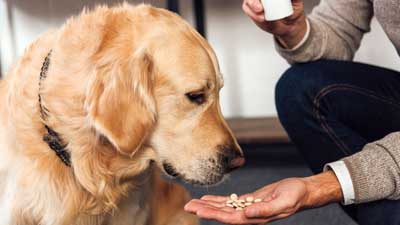- Size
- Smallest
- Small
- Small to Medium
- Medium
- Large
- Giant
- Characteristics
- Smartest
- Hypoallergenic
- Fluffy
- Best Guard
- Best Family
- Best for Kids
- Low Shedding
- Healthiest
- Police Dogs
- Most Calm
- Quietest
- Color
- White
- Black
- Grey
- Brown
- Blue
- Red
- Coat
- Hairless
- Short
- Long
- Origin
- Japan
- China
- Australia
- Germany
- Italy
- United States
- France
- Group
- Hound
- Terrier
- Herding
- Toy
- Working
- Sporting
How To Treat Syncope In Dogs

Syncope in dogs is a syndrome characterized by a sudden and temporary loss of consciousness, accompanied by a fall, and may be accompanied by convulsions. It also happens that the dog relieves himself under him (stools and/or urine) during the period when he loses consciousness. Fainting occurs when the brain no longer receives enough oxygen (hypoxemia) or glucose (hypoglycemia).
Syncope in dogs: the causes
The brain, like all organs, needs oxygen and glucose to function. Neurons are big consumers of energy. It is therefore understood that the supply of sufficient blood volume to the brain is a priority for the body. Thus, if the flow of blood to the brain suddenly stops for more than 10 seconds, the animal loses consciousness.
Syncope due to lack of oxygen (hypoxemia)
Any condition that can cause a drop in oxygen supply to the brain can cause syncope, including:
• During a decrease in cardiac output caused by an arrhythmia (i.e. a heart rhythm disorder) or heart disease (cardiomyopathy, aortic or pulmonary stenosis, tumors).
• In impaired oxygen supply to the lungs, such as damage to the lung paunchy or pleura, and obstructions of the upper airways (tracheal collapse, stenosis of the nostrils, thickening or elongation of the soft palate).
• During a neurological condition such as a brain injury or a brain tumor.
• During hypo tension following a sudden drop in blood volume (hemorrhage or severe dehydration), a violent coughing fit, or vasodilator medication
• During a vasovagal syncope which occurs in healthy individuals, following a sudden event (heat, excitement). Hyperactivity lowers cardiac output.
Syncope due to lack of glucose (hypoglycemia)
Hypoglycemia can occur in an animal that makes an intense effort, away from a meal. They are common in diabetic dogs that receive too much insulin. Much more rarely, dogs can be affected by a type of tumor of the pancreas which increases the secretion of insulin by this organ (insulin).
Syncope symptoms in dogs
Syncope can happen only once or recur. Syncope is manifested by a sudden loss of consciousness, then by the recovery of the dog, which begins to behave normally once the crisis has passed. If your dog loses consciousness, a visit to the veterinarian is to explore the possible causes. Quite often syncope takes place at home. To help the veterinarian, you can film your dog's crisis and describe the warning signs precisely (if there were any).
Some symptoms can be noted:
• A heart murmur
• A heart rhythm disorder
• Abnormal pulmonary auscultation
• Behavioral problems
They will refer the veterinarian for a diagnosis.
Diagnosis and treatment of syncope
The diagnosis is based on a complete blood test (glycerin, liver parameters, blood count) and the realization of a chest X-ray. If a heart rhythm disorder is suspected, an electrocardiogram (ECG) is recommended.
There is no anti-syncope treatment; also, the cause of syncope must be treated. If a heart disease is diagnosed, it is necessary to set up lifelong treatment (often thanks to a combination of pimobendan/IECA/furosemide, but each case is unique) and regular follow-ups.
And when the brachycephalic syndrome is severe enough to interfere with the dog's breathing, laser surgery is recommended.
References
- [1] ^ VCA Animal Hospital: Syncope Fainting in Dogs
You May Also Like
 Dog HealthHow Long Do Dogs Live With Encephalitis?
Dog HealthHow Long Do Dogs Live With Encephalitis? Dog BehaviorHow Can Dogs Tell If Someone Is Good Or Bad
Dog BehaviorHow Can Dogs Tell If Someone Is Good Or Bad Dog HealthCan humans Get Parvo from Dogs?
Dog HealthCan humans Get Parvo from Dogs? Dog HealthHow Long Does It Take A Dog To Show Signs Of Parvo?
Dog HealthHow Long Does It Take A Dog To Show Signs Of Parvo? Dog HealthCan I Give Human Amoxicillin To My Dog?
Dog HealthCan I Give Human Amoxicillin To My Dog? Dog HealthWhat Happens If A Dog Eats Amoxicillin?
Dog HealthWhat Happens If A Dog Eats Amoxicillin?